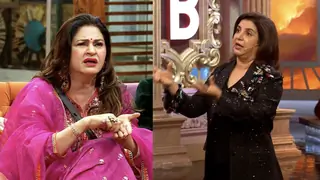While a lot of discussion happened on the Monday's episode, especially the part where Mukhi said "why Aru needs to work no one seems to have noticed what he said earlier.
And THAT part was the gist of conversation for me. (He elaborated more on this in yesterday's episode). When she said that she can take care of factory without blinking an eyelid he said "Woh to main jaanta hun And that part stayed with me.
It was not just a fond pampering by a husband. It was a trust that she earned from him by her work ethics, grit and determination.
His reason for asking her why she needs to do this, I felt, was different than saying women need not work. He does not look down at any work or has stupid prestige issues. But he does not see her staying here for long and he does not think that she has to pay for her sister's deeds (in action by marrying him, or in amount by paying back the cost of the jewelery)
And I guess in one of the discussions about women working and their's husband's reaction to it, someone (I guess Vi) said about why guys feel it is a strike on their ego.
I think the wording he used "Tuze paise ki kya jaroorat, Jo mera hai wo tera hai instead of "Tuze jo chahiye maang le makes a lot of difference.
The key issue is not if women need to work out to earn money but that they should get respect for the work they do at house too.
My mother had a job as a nurse while my grandmother and my aunt (my dad's elder brother's wife) were homemakers. But this feeling of dependency was never a problem in our household as starting from my grandfather, we had a tradition that the men in the house used to give all their salaries to their wives (to mother before wedding but to wives post wedding) and they managed the house.
In our home it was typical that if a man needs something he used to ask for money from his wife. :-D So it was never an issue who earns the money. It was household money and they were money managers.
P. S. In France, in case of income tax filing, the money earned by all members (husband and wife and dependent kids) is allocated to family and it is allocated half and half to both husband and wife even if the woman is not working outside the home.
(We should stop saying that a woman is not working when she is a homemaker, she does work, just is not getting paid)
































